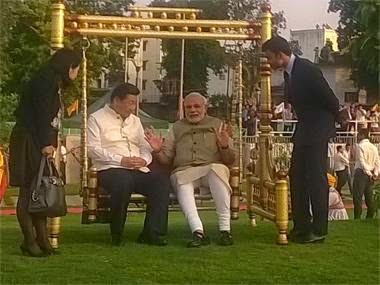The India China Powwow - Will It Ever End?
 |
| Modi and Jinping relaxing on the traditional Sankheda swing (picture courtesy Firstpost) |
On Xi's part, the message is interesting. A visit to the Sabarmati Ashram, the spiritual home of Mahatma Gandhi in India, and an intellectual adversary of Chairman Mao, the President has indicated deep interest in harbouring long term peace with India and the mutual interest in the status. Of course, there is a military standoff going on at the Chumar sector in Ladakh, but a close assessment of the Chinese situation shows that since the People's Liberation Army (PLA) is not directly under Xi's control as of now, the political intent of the PLA is to keep reminding Xi where his priorities must lie. And it will take some time for Xi to gain strength over the military. In fact, there have been repeated statements about India being important for China to change the world for good from his end. It sees India as an investment destination as well as a market for quality goods as a hedge against the faltering economies of the West among other things.
Cultural ties are already on the rise without any extra efforts, so there isn't much that needs to be done about it, especially with more and more Indians studying and working in China. The success of Indian movies in China and Chinese movies in India are a good indicator of how much closer people are than the perception on either side goes.
But that is where the bonhomie tends to come to a grinding halt. The border issue has been festering for far too long to allow any form of friendship to develop. While the ASEAN model of economic cooperation is sought here (ironically India and China contributed to the formation of ASEAN), both parties know that it cannot sustain itself for too long. The golden period for settling the disputed border has arrived, and unless it gets settled now this problem will be pushed into the next decade. Both sides realize the importance of a face saver for the other, and the sooner this issue is resolved, the better it is.
However the advantage that India has lies not so much in the economic sphere as in terms of soft power. The PRC government runs the country more like a corporation, and it is always in any corporation's interest to resolve all legal matters quickly before it leads to mounting costs, thus reducing profits in the long run. Indians by and large will be fine with the status quo becoming the international border; however, the mounting economic costs of the unsettled border will mean headaches for China since it will not be able to continue raising its military expenditure astronomically with the United States breathing down its neck. That approach, as a corporate negotiator looking for a good deal, instead of a man haggling over what the price a kilo of chicken will be, may cut ice with the business minded Chinese.
In Indian culture, the swing (jhula) has a lot of symbolism to it. However hard or fast it may swing, friends sharing it stay on it together. To reach that phase however, there is still work to be done. The powwows will continue forever, but it has to come to an end which is meaningful for all. Ties will not go the next step, and the Chindia century or the Asian century will never dawn if the two largest countries are not able to settle the border issue permanently and honorably.


Comments